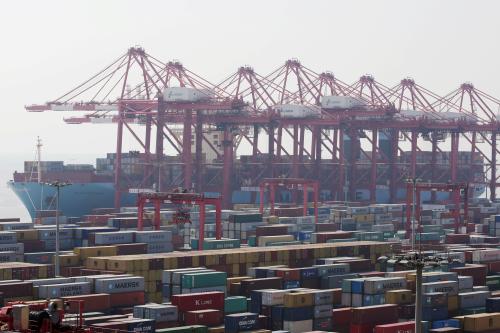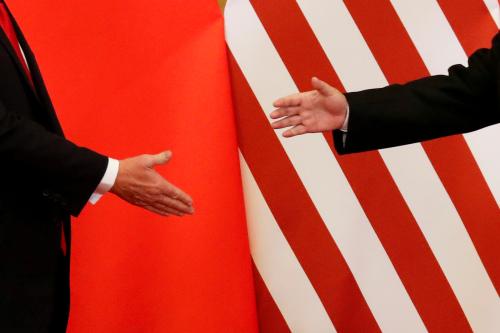At the G-20 summit last weekend, President Trump signed a new trade deal with Canada and Mexico and announced a pause in the U.S.-China trade conflict. But the rest of the summit was fairly predictable, with few fireworks. This piece originally appeared in the Washington Post.
This past weekend, President Trump was in Argentina for the Group of 20 summit. Although he signed a new trade deal with Canada and Mexico and announced a pause in the U.S.-China trade conflict, the rest of the summit was fairly predictable, with few fireworks.
The death of former president George H.W. Bush cast an unexpected shadow over the proceedings, prompting some nostalgia for his enthusiasm for foreign policy and international gatherings. But even before news of his death broke, the gathering seemed distracted from any grand multilateral goals because many world leaders—not just Donald Trump—arrived in Buenos Aires facing serious domestic problems back home. Here are some key takeaways:
Big international meetings are losing some of their relevance
The G-20 and its cousin, the Group of Seven, bring the leaders of the world’s largest economies together with the goal of promoting international economic cooperation and stability. As Orfeo Fioretos explained in the Monkey Cage, such meetings are “highly orchestrated affairs that send powerful signals” about the world’s leading economies.
Getting the world’s democracies to agree is hard enough—but the G-20 also includes authoritarian economic heavyweights such as China and Saudi Arabia. Major breakthroughs on specific issues tend to happen through lower-level diplomacy, though endorsements and commitments from powerful world leaders can still be important.
But the lead-up to the latest G-20 steered clear of any big collective ambition. Instead, the buzz was about which bilateral meetings and “pull-asides” were on or off.
Many leaders spent their time in Argentina thinking about their problems back home
It’s tempting to attribute this G-20 summit’s avoidance of grand collective politics to Trump, who veered off-script during or after several recent multilateral gatherings (including this summer’s G-7). But the real problem in Argentina was that many leaders brought heavy domestic political baggage that led them to prioritize (or cancel) bilateral sessions based on their political needs. It’s never fun to be at a party where everyone has one eye on the door.
Trump faced new developments in the Russia investigation, making a potential meeting with Russian President Vladimir Putin particularly fraught. Trump abruptly canceled the meeting, citing last week’s Russia-Ukraine naval clash.
Other leaders found themselves of in what political scientist Robert Putnam calls a “two-level game,” where they must play both international and domestic politics simultaneously to secure their goals. For British Prime Minister Theresa May, the goal was firm support and a clear path to future bilateral trade deals. May’s Brexit deal with the European Union faces a day of reckoning with the E.U.-sanctioned plan scheduled for a December 11 formal vote in the British Parliament. The odds aren’t in May’s favor, and in Buenos Aires, May tried to reassure leaders that the United Kingdom could avoid the uncertainty of a “no-deal” Brexit, if May’s plan does not get through Parliament.
French President Emmanuel Macron returned from Argentina to ongoing domestic protests that had turned increasingly violent in Paris. The “Yellow Vest” protests target increased gas taxes designed in part to combat climate change—a stark reminder of the backlash against G-20-style global governance amid deepening inequality.
Saudi Arabian Crown Prince Mohammed bin Salman (MBS) found few friends at the G-20, with continued questions over his role in the killing of journalist Jamal Khashoggi. Many leaders, including Trump, did not sit down with him for a meeting—but interestingly, both May and Macron did, perhaps in an effort to show stability and continuity. Simply getting through the summit without a coordinated G-20 response to the death of Khashoggi could be considered a victory of sorts for MBS.
What would George H.W. Bush have done?
The news that George H.W. Bush had died on Friday night brought a poignant perspective to the G-20 events. Though many analysts rightly focus on Bush’s internationalist orientation and stewardship in the uncertain years as the Cold War ended, Bush also faced many moments when the domestic problems and behavior of American allies and adversaries seemed to clash with U.S. interests.
Bush navigated these moments with a kind of internationalist realism that is almost extinct on the Republican side of the aisle. In my book on how leaders’ pre-presidential beliefs about the nature of threats affect how they make decisions to intervene in crises once they get into office, I found that George H.W. Bush fit squarely in the camp that did not see threats originating from other nations’ domestic politics but rather from what countries do in the international arena. He formed these beliefs in a pre-presidential career that featured unusually broad and deep experience in high-level foreign policy and national security posts.
A striking example of Bush’s realism came after China’s 1989 Tiananmen Square massacre. Bush, the U.S. envoy to China in 1974-1975, had developed ties with Beijing and a clear sense of China’s future importance in international relations. In 1989, President Bush took initial steps to publicly punish China after Tiananmen, including suspending arms sales and some military and diplomatic exchanges. But he bucked pressure to do more and instead took steps to stabilize and maintain U.S. relations with China, including secret diplomatic missions.
One can only speculate, of course, how Bush would have approached this year’s G-20 meeting. It’s easy to imagine he would have prioritized global stability and backed up May and Macron. It’s likely Bush would have thought the U.S.-Saudi relationship worth preserving—he had stationed thousands of U.S. troops in Saudi Arabia to fight the Persian Gulf War, after all, partly in the name of protecting the kingdom. But Bush, a former CIA director, would not likely have issued a public statement in support of MBS and cast doubt on the findings of the CIA, as Trump did last week. In fact, it’s not difficult to imagine he might have publicly rebuffed or sought to rebuke MBS.
The Buenos Aires G-20 summit revealed that several international issues seem to be at a fork in the road, with domestic politics likely to shape how risky or damaging the outcome will be. In the economic realm, the U.S.-China trade conflict gained a 90-day reprieve but remains tense, with domestic pressures and divisions within both countries that have yet to play out. In Europe, the outcome of Brexit remains highly uncertain and depends on May’s domestic tightrope skills.
This year’s G-20 suggested that global meetings are less and less helpful in managing these uncertainties. And Bush’s death was a reminder that managing downside risk in foreign policy—a task that often requires making difficult choices, and can sometimes be made easier by acting multilaterally—is no mean feat.







Commentary
The G-20 summit was overshadowed by other news. But there wasn’t much to overshadow anyway.
December 6, 2018